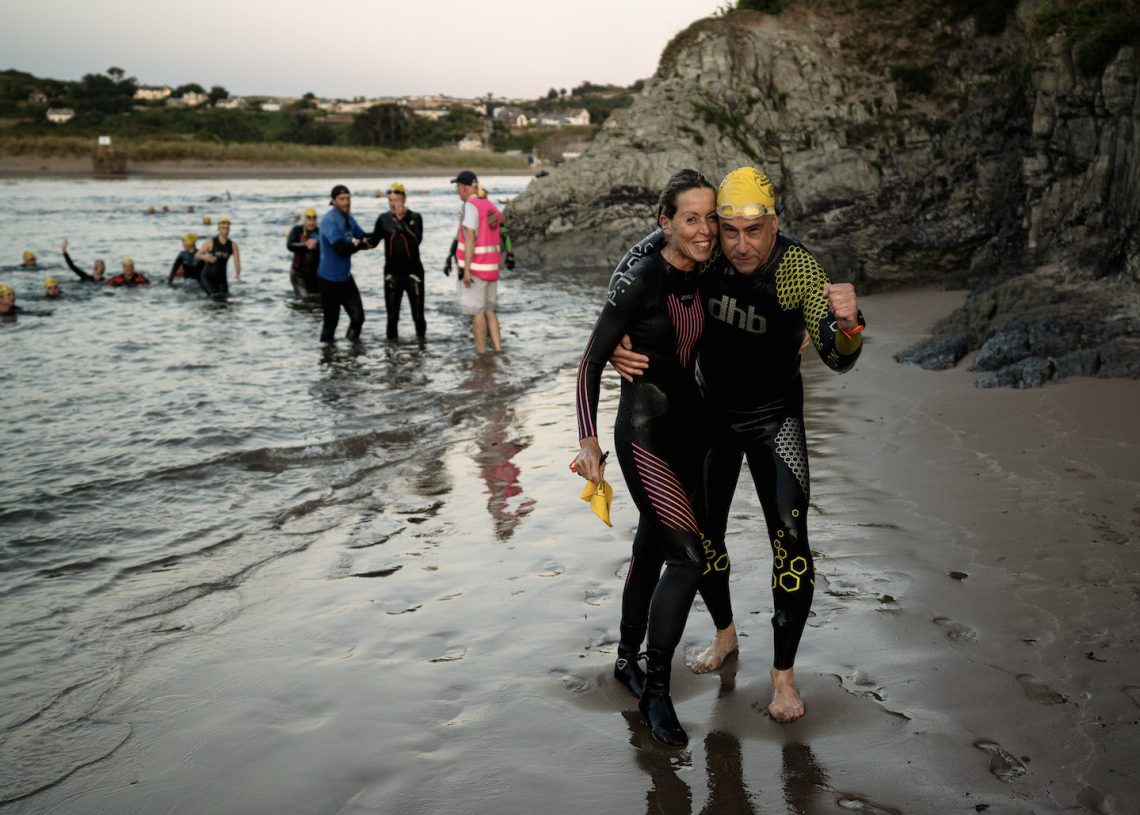
How swimming events shape the world of outdoor swimming
Open water challenges shape outdoor swimming more than you realise. Rowan Clarke investigates.
There’s a stretch of the iconic Dart 10K swim with a unique view: glistening water, land unreachable by road or footpath and a stream of swimmers snaking down this beautiful river.
What makes this view so joyful is that the 400 or so fellow swimmers are not only on the same swim from Totnes to Dittisham, but also a similar journey of training, preparation and fundraising.
With you, they share a love of outdoor swimming, support for the same charity and anticipation for the finish line.
Open water swimming events like the Dart 10K are seminal in the outdoor swimming world. Our introduction to the sport or an aspect of it, they offer a relatively safe, affordable and structured way to explore distance, speed or endurance. They allow us to experience hard-to-reach stretches of open water, to raise funds and awareness, and to immerse ourselves in the outdoor swimming community.
Surge in popularity
Unsurprisingly, the number and variety of events has grown as outdoor swimming has become more popular. But it would be a mistake to think that events exist to capitalise on this increased popularity or cash in on our open water ambitions.
By offering safe and supported ways in for new swimmers, outdoor swimming events have in fact helped increase awareness and visibility for the sport.
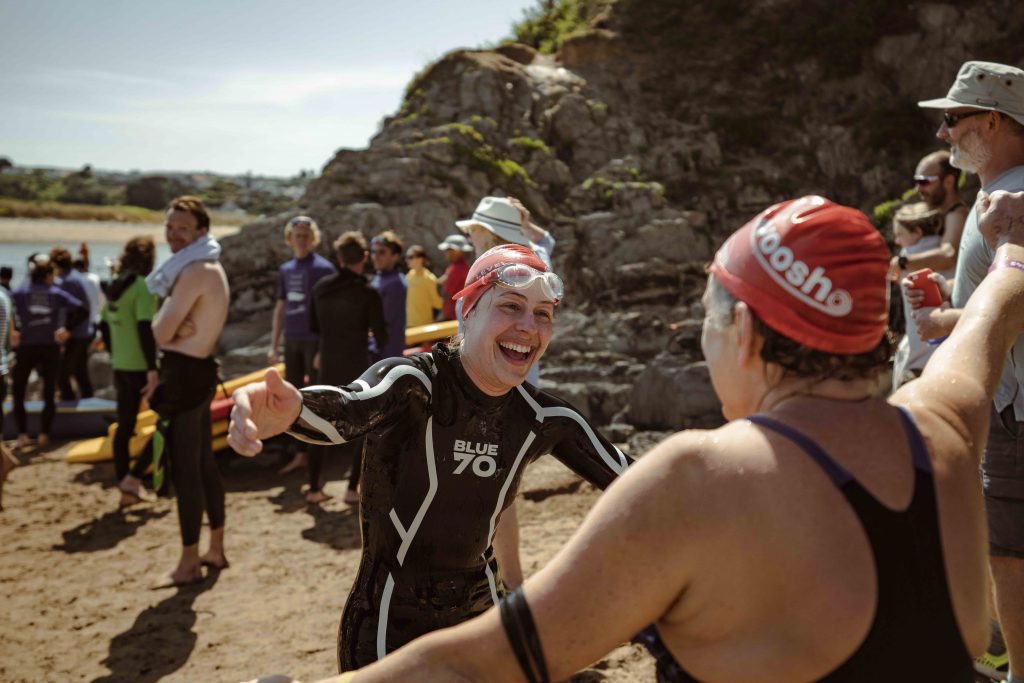
That means they also have the potential to influence how outdoor swimming continues to grow, from widening participation and improving access to training new coaches and increasing investment. So, how can we support open water swimming events and help unleash that potential?
The starting line
Until recently, open water swimming events were a gateway into outdoor swimming. By entering, training and participating, new swimmers learned about all aspects of outdoor swimming from sighting and safety to access and kit.
“I always swam in rivers and the sea, but I didn’t realise open water swimming was a thing until I found the Great North Swim in 2014,” says Rachel. “I have a condition that effects my joints and couldn’t do the running events my friends were doing, so I entered the swim. That was a turning point for me. I did the Dart 10K next, then ice swimming events, then I started a year-round swimming group to support others.”
While many swimmers have similar stories to Rachel’s, people are now much more confident about finding their own way into open water – especially post-pandemic when events went on hold and outdoor swimming hit the mainstream.
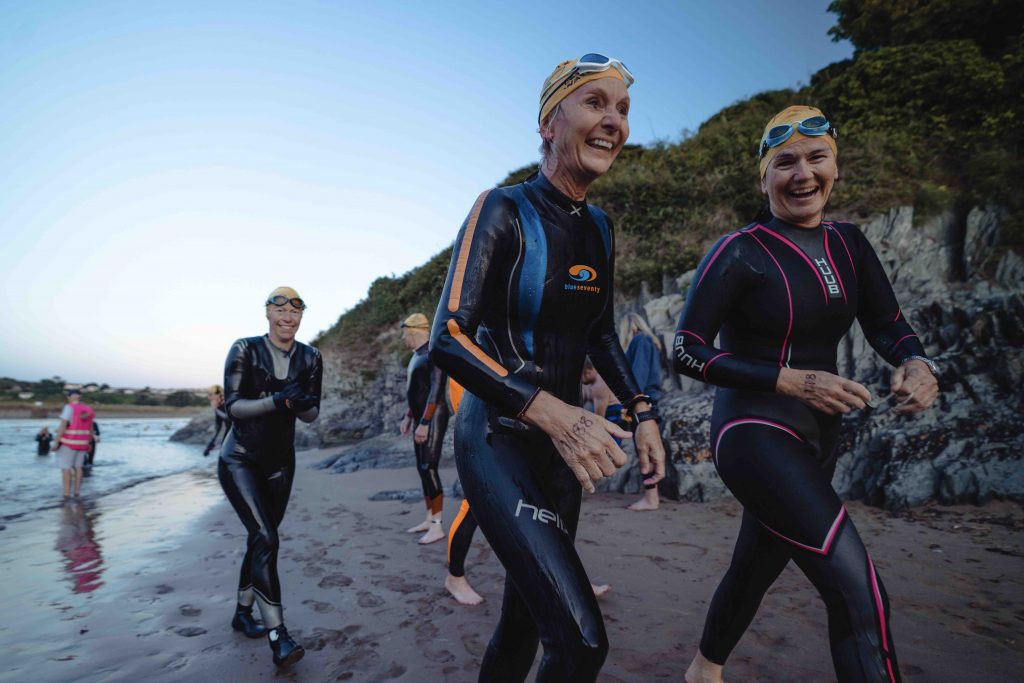
And yet, events still have a pivotal role to play both on a personal and community level. The key is a strong emphasis on participation over competition. While there are competitive events, most outdoor swimming events are all about the personal challenge and cultivating a sense of community.
For example, during the Scilly Swim Challenge, an incredibly joyful community event, the elite wave will get held for the slower wave to catch up, and prizes are awarded for attitude not aptitude.
Open to all
This participation-centred approach rewards everyone. Heads-up breaststrokers, children and pensioners accomplish their goals alongside elite swimmers and everyone wears a medal at the end. Equally, different events celebrate skills other than speed, such as distance, ice or sea swimming.
“What the UK does really well is getting people from ground level, people who are used to heads-up breaststroke, and getting them into the sport,” says Colin Hill, the visionary behind the Great Swim series and Chillswim events.
“I wanted people who swam in a pool to come along and feel safe and catered for, so you could just you rock up and swim without worrying about anything. There’s a great atmosphere and you’re doing something challenging. You’re sharing that common thing and you’re part of a community, and from that you get the confidence to do something else.”
Going the distance
That something else is often a more challenging swim. Whether people start swimming outdoors with an event or not, it’s those longer distance or colder temperature endurance swims where the safety and expertise offered by open water events come into their own.
Difficult and expensive to organise, distance swims require intense planning.
The two-day 15km Scilly Swim Challenge in the Isles of Scilly is a perfect example. Without it, swimming across the sea from island to island wouldn’t be possible unless you hired your own support crew who knew the tides and currents.
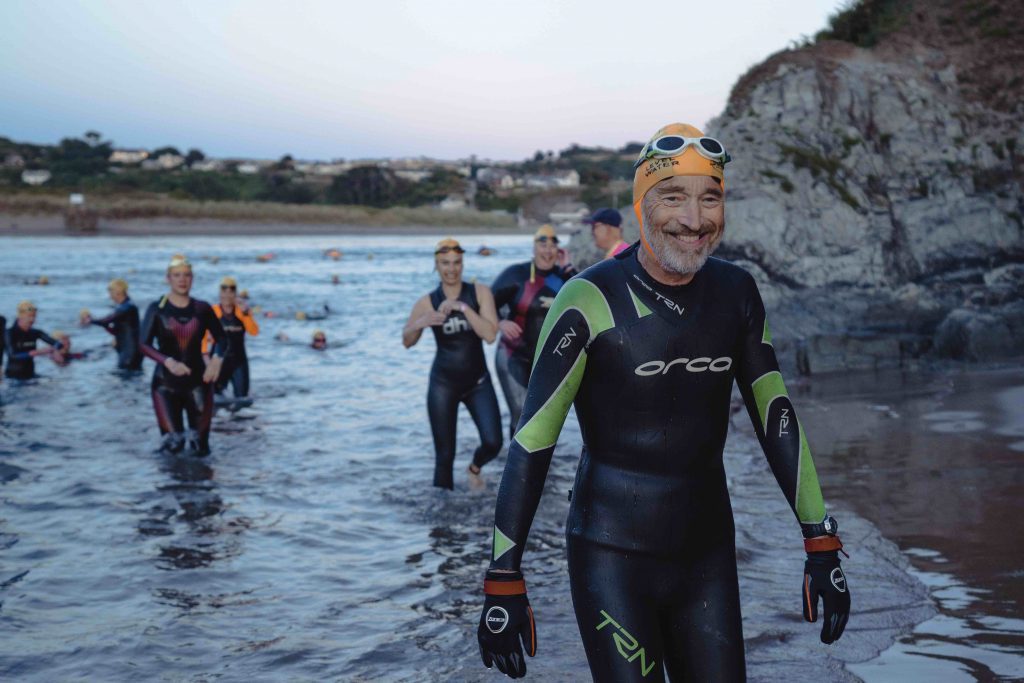
Even for seemingly straightforward point-to-point swims like the Chillswim Windermere End to End and Dart 10K, there are still a huge number of factors that the event organiser manages at great financial cost and stress.
“It’s hard to explain how complex the organisation of a point-to-point swim is,” says Ian Thwaites, CEO of the charity Level Water that took over the Bantham Swoosh and Dart 10K in 2022. “Hopefully, it looks to participants as if you show up, get bussed to the start line, swim to the finish line and go home. But there is nine to 12 months of work that goes into making that happen.”
Of course, there’s much more work, stress and cost in organising a swim for 800 swimmers than a solo swim. But, by running mass swim events, more swimmers get the opportunity to accomplish their swimming ambitions.
That’s not to say that swim events are cheap – your entry fee covers the event infrastructure and not much more.
So, sponsorship and fundraising are critical for open water swimming events to make any money. For example, the charity Level Water relies on individual sponsorship at its events to operate. But, its title sponsorship, where an event gets significant investment from a big sponsor, that makes the biggest impact.
“The model for big events used to be location, partnership, title sponsor and then the entry fees,” says Colin Hill. “But the location sponsors all disappeared and local government authorities don’t have that much money and it’s really hard to get a good title sponsor for swims. You can get people who come in and cover the cost of some things, but the big sponsors are just not around anymore. So, you rely on the entry fees alone.”
In the event of cancellation
For swimmers, paying an entry fee is acceptable until the event gets cancelled. At this point, unless the organiser has the right insurance (another cost), they’re unlikely to be able to give you a refund.
Considering that open water swimming depends on so many variables, cancellation is a distinct possibility, so you should always check the cancellation policy when you enter an event.
And the risk of cancellation increases with distance. This is partly the nature of distance swims as conditions can deteriorate over time and place, and partly down to the number of participants.
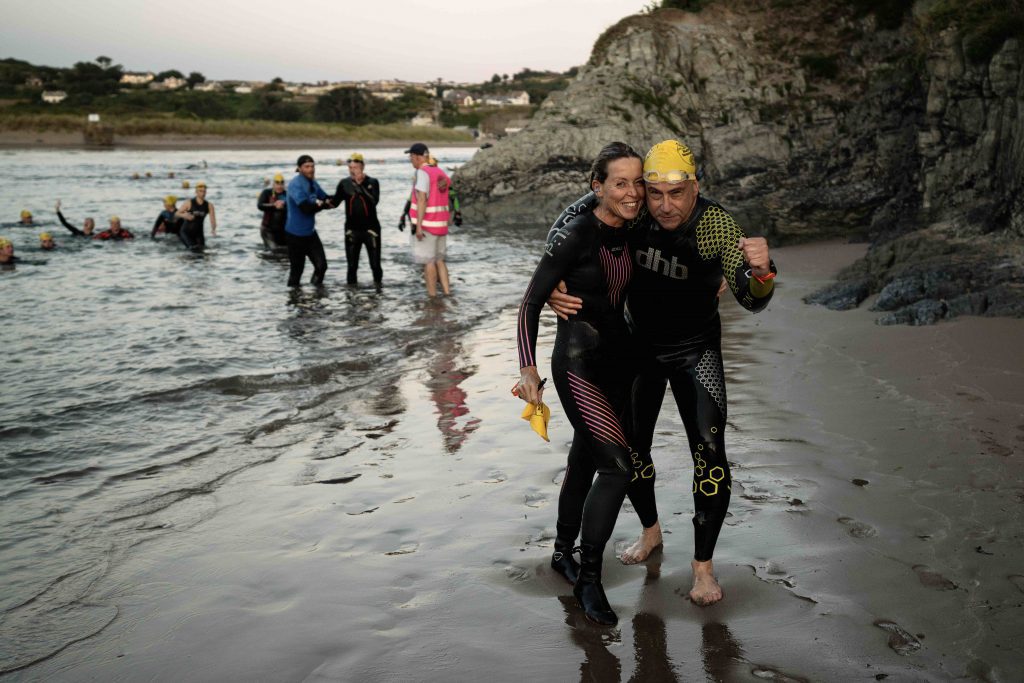
“The difference now with events is that a lot of them are tipping over into these long-distance swim events and the risks are greater because there are a lot of people who’ve signed up who aren’t really that experienced,” says Colin. “They like the comfort of doing a big event because everything’s organised and they’re totally looked after. But, if the wind’s 20 miles per hour in a certain direction, a lot of people are going to really struggle.”
This is exactly what happened in September 2022 when forecasted wind caused organisers to cancel a few events, including the Dart 10K and Windermere End to End.
Cancelling is a difficult, heart wrenching decision for any organiser who’s put in months of organisation and invested thousands in the event infrastructure. So, when they cancel it’s their only choice. Which doesn’t make it easier to swallow.
After all that training, fundraising and expenditure on kit, coaching, accommodation and travel, having your swim event cancelled is disappointing and frustrating. It’s even worse if, when you look out of the window or wander down to the start line on the day, it doesn’t look too bad.
A difficult choice
“It’s not always an obvious thing. If you cancel an event, you’ve got to make the decision at some point,” says Colin. “And you want it to be blowing a hoolie because then everyone goes yeah, good choice. It’s
when you cancel for the right reasons, but it doesn’t turn out the way you think. That’s the annoying thing; the weather forecast can be wrong. But people have to realise that no one wants to cancel events.”
Event organisers employ the services of a water safety crew. This team of highly skilled and often local water experts have the final say about event conditions.
Looking at forecasts right up to the day of the event, they can determine how wind speed and direction, rainfall, visibility, water quality tides and currents will affect swimming conditions. Organisers use them to understand the peculiarities of a particular location, keep swimmers safe in the water and get insurance.
“I think that a lot of people don’t realise that the event organisers use a water safety company,” says Colin. “They can make an independent decision; it’s not down to the event organiser, which it shouldn’t be because the event organiser has a conflict of interest because they don’t want events to be cancelled. But then you’re in the dilemma thinking, well, I’ve got to put the event on. But if you overrule them and things to go wrong, you’re going to end up in a Coroners’ Court.”
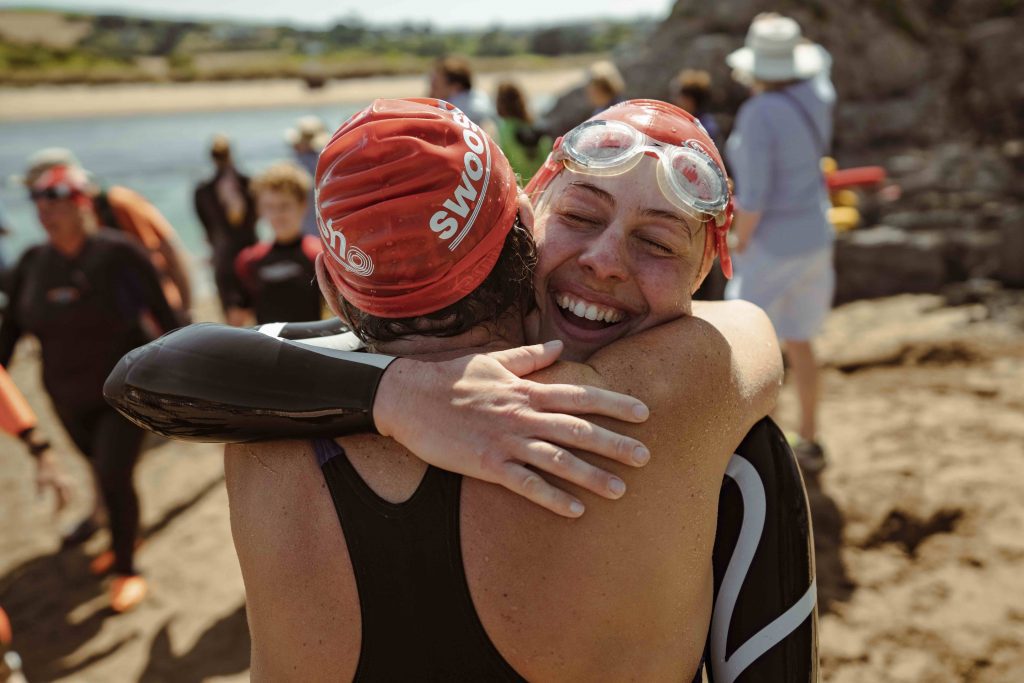
It was the water safety crew and Harbour Master who decided that the Dart 10K should be cancelled because the wind speed and direction would cause huge, head-on waves towards the end of the swim that wouldn’t be swimmable for the majority of participants and would impede visibility.
“I think the reality is it was a very difficult situation, particularly in our first year of running the event, but I’m very proud to be able to say that we put safety first,” says Ian. “I would much rather be in a position where we cancelled the event and some people will be frustrated and angry, than be in a position where we put somebody in danger.
“I ended up reading every email that came in and everything that was said on social media; we got as much support as we did frustration and I’m really thankful to those people,” he says. “The frustration is utterly understandable because it’s not just the event, it’s the weekend, time off work, booked accommodation and some people had started travelling already.”
Events for the future
Amazingly, considering the risks and variables, most open water swimming events go ahead without a hitch. And more than that, they bring joy, benefitting us as individuals, as well as our communities and the environment.
“I think events help minimise our environmental impact by concentrating swimmers and helping them be more aware of where to swim without damaging habitats or disturbing wildlife,” says Michelle Walker from The Rivers Trust. “They’re also a great way to raise money for charities like Level Water and
environmental citizen science projects with The Rivers Trust.
“I’m also really pleased to see more and more events encouraging swimmers to think about biosecurity and the pressures our rivers and water habitats are under. We then get their support to help us raise awareness among MPs and put pressure on the Government to do better.”
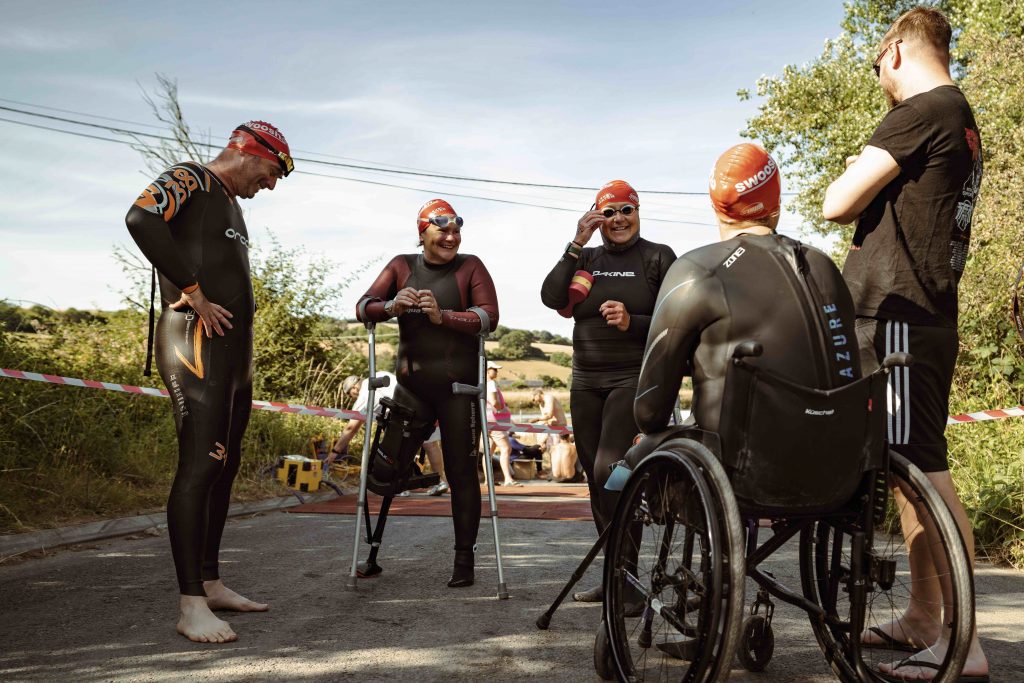
Another area where open water swimming events have an important role is in widening participation. While outdoor swimming communities have an inclusive attitude, in that they welcome everyone, real inclusion comes from seeing who’s being left out and removing the barriers that prevent them from joining in.
While there’s still a lot of work to do, event organisers are starting to use open water events to widen participation in the sport. For example, Kelly Smith is looking to set up a triathlon for people who identify as people of colour (POC); Jonty Warneken has just launched a challenge designed around the needs of people with disabilities; and we wrote in issue 65 about events that get young people into outdoor swimming such as the Mini Swoosh.
“This year we had a bunch of children that Level Water had taught to swim take part in the Mini Swoosh and it was a feeling of everything coming together; a decade of growing and building this charity,” says Ian, emotionally. “These children, who have learned to swim with us… Then we’ve taken over the event, and here we are on the beach watching these children and their families coming down the river and having their first experience of swimming outdoors.”
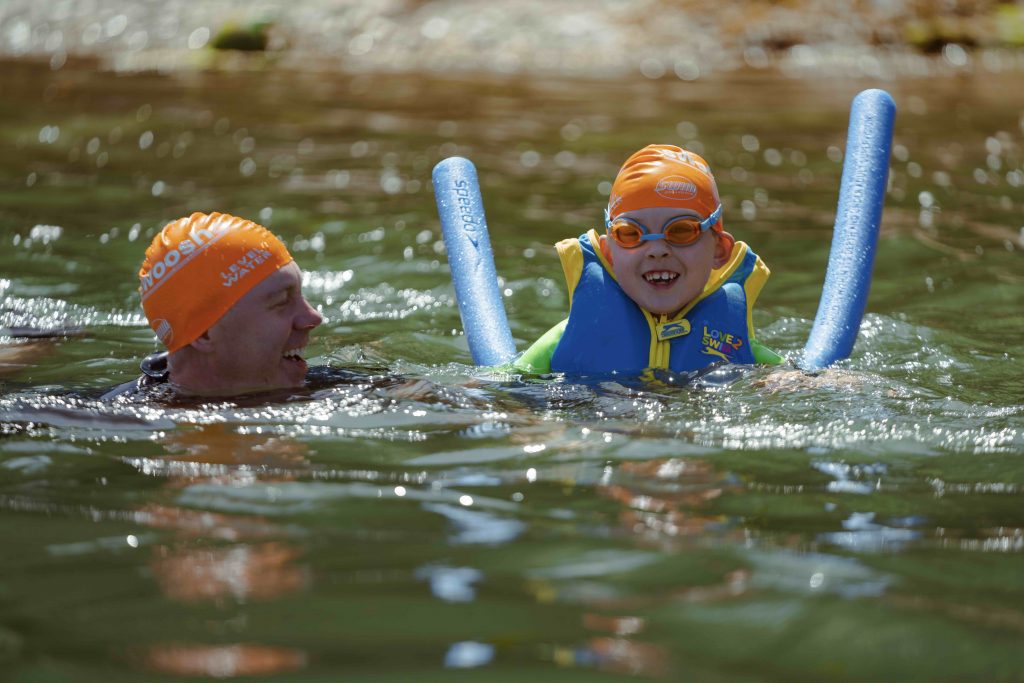
If events can cast the net wider and create more pathways into outdoor swimming for those who face financial, physical or social barriers, then our communities will become truly inclusive and more people will benefit.
So, far from being a way to monetise our favourite occupation, open water events continue to shape growth in outdoor swimming, offer safe and supported ways in for new swimmers, increase awareness and visibility for the sport and for the environment. Through our continued support and patronage, they have so much potential to widen participation, open up new venues, back environmental improvements and attract more investment.
Best of all, they can bring us joy. They help us celebrate our own personal achievements with our families, friends and the wider outdoor swimming community. We’ll leave you with Ian, as his words sum up this feeling so perfectly.
“The walk to the start line surrounded by hundreds of people; there’s just humanity to it that you can’t recreate,” he says. “Being in the water with a sense that there are these people around you, seeing this snake of bodies ahead of you up the river feels amazing. There’s this sense of a journey and being a part of something. And so, I think there’s a joy in being surrounded by other people who are on that journey with you; a sense of community and connection and meaning.”
This article is from the February issue of Outdoor Swimmer. Click here to subscribe to the magazine. Photos: James Malone Photography
Browse our Events calendar for your next swimming challenge.
To see all the online content from the February 2023 issue of Outdoor Swimmer, visit the 'Challenge' page.







